With the prologue over and the game’s true title screen shown, it’s time to start the real adventure!
Bombing Run
The chapter starts off with a bang – literally! Bombs start blowing up as weird soldiers in pig masks flush out animals they can use for their eerie experiments.
As the bombs explode, the word “BOM!” appears. “BOM” used this way is pretty common to see in Japanese manga, anime, and games, even if it isn’t something we use in actual English.
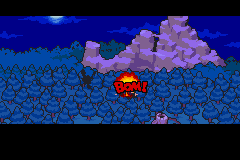 |
I considered editing these to say “BOOM” or something like that instead, but only for about half of a second. It didn’t seem like it was worth the trouble and “BOM” seems acceptable anyway.
Still, sometimes I wonder if NOA would’ve altered it.
Chapter Titles
One thing I always enjoy seeing in localizations is how graphical text is handled. In this case, we replaced the graphic data for all the chapter titles with our own custom graphic data.
It’s not as easy as it sounds – we had to deal with OAM, pattern tables, hardcoded size limitations, and stuff like that. But Jeff and Reid worked together to make the final chapter titles look nice and professional!
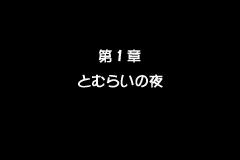 | 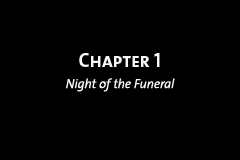 |
A Fiery, Firey Fire
Near the start of Chapter 1, Thomas runs around like crazy, shouting about a fire in the forest. One of his initial lines is, “The Sunshine Forest is on fire in a huge, firey, flamey fire!”
I knew “firey” isn’t an actual word (“fiery” is), but I wrote it that way in the sense of “fire-like”. Looking back, it would’ve made more sense if I’d included a hyphen, like: “fire-y”. I got a lot of typo reports about this, and although I intentionally spelled it this way I can’t help but feel that I dropped the ball with it. I’ll probably fix it in a future patch, either to “fiery” or “fire-y”.
Sorries and thanks to everyone who wrote in about this one!
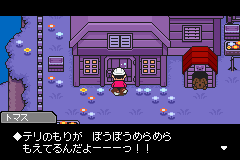 | 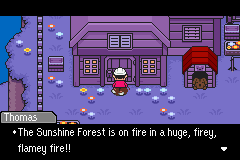 |
Hold That Thought
Many times things get lost in the localization process (whether it’s a game, movie, book, or anything else), just because that’s the way things are. Here, we see that the Japanese script uses the vowel elongation character at the end of Flint’s name. It makes it a lot more emphatic and realistic than simply adding a bunch of exclamation marks.
I was at a loss on how to handle situations like this throughout the script. In the end, I think I had to just skip over them and hope the exclamation marks would suffice by themselves. It wasn’t a big deal, but it was something I was mindful of at least.
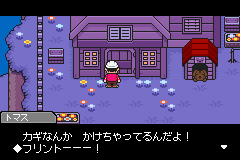 | 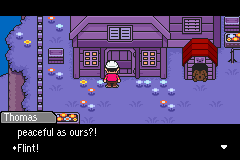 |
Also, I think these vowel elongations were included as part of the game’s coding – the writers didn’t actually include them in the script; they simply used a different control code than normal, so instead of typing it like this:
[FLINT]—–!
they probably had something more like:
[FLINT_EMPHATIC]
And then the game would know to add in the emphasis stuff on its own.
I suppose we could’ve compensated for this by writing some sort of string capitalization routine, but the name control codes are so weird in this game that even now I’m not really sure how they work. I just simply nodded my head and used the same name control codes that the Japanese version used in each instance.
Chew on This
After you get the Stick weapon from Boney’s doghouse, Thomas tells you how to equip it and then says, “Just holding on to it’ll make it as useful as a caramel.”
A common question I hear is if that was something I added or if that was what the Japanese game actually said. The answer is that it’s in the Japanese game too.
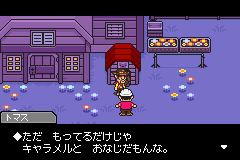 | 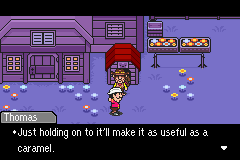 |
Describing Items
I plan to have a section detailing item name translations and item description translation comparisons, but very quickly I wanted to point out that although I had some involvement with the menu and battle text, much of it was done instead by Lindsay, who is equally as fanatic about the series as me and was polishing her own translation skills at the time.
Honestly, she did a way better job at making the item and enemy description translations sound better than anything I could’ve done, so if you ever smiled at an item or enemy description, you have her to thank!
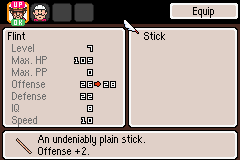 |
Article Addendum
Almost since EarthBound’s release I was fascinated with the work that went into localizing the game – not just the text, but all the nitty-gritty programming stuff that most players would never notice – and probably still haven’t! I guess it’s because the idea combined three things dear to me – translation, programming, and EarthBound.
In Japanese, there are no articles like “the” or “a” to deal with, which is very nice and handy for MOTHER 2, but in English it sounds clumsy to say things like, “You found Bottle Rocket in the gift box.” Just stick an “a” or a “the” in there and it’ll feel more natural, though.
Most game translations didn’t bother with this back then, but EarthBound at least attempted to deal with it in an interesting way – by including “a” all the time and then making sure all the item names started with a consonant:
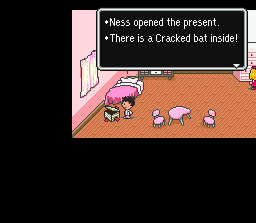 | 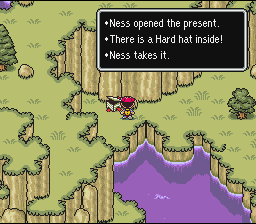 |
Of course, they sometimes forgot or messed up:
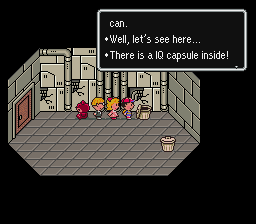 | 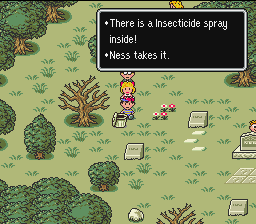 |
They even went through the trouble of renaming items to fit with “a” properly – for example, “Lifenoodles” would be weird with an “a” before it, so it was renamed to “Cup of lifenoodles”. “Orange juice” wouldn’t work with an “a” before it, so it was turned into a “Can of fruit juice”.
I point all this out to show that Nintendo of America took some interesting steps to make EarthBound’s text sound decent with all of its item names.
For MOTHER 3, I wanted to take things even further and do it even better. So we actually went in and added some custom programming and data that allowed us to say if an item should use “a”, “an”, “the”, “some”, nothing at all, or anything else we wanted at all! We also added support for capitalization in case an article appears at the start of a sentence.
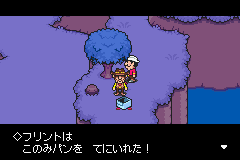 | 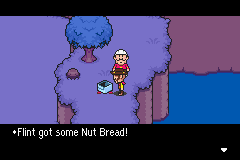 |
It was a lot more work than we expected due to weird design by the Japanese programmers, but it was worth it. My hope was that players wouldn’t even notice we did anything with the item names – that sentences including item names would flow naturally.
Is It Really Her
So there are two children in Tazmily named Nichol and Richie. Yes, I think they were named after Nicole Richie. For some reason, the Japanese are (were?) fascinated with her.
A common report I got was that I somehow messed up the kids’ names. I didn’t though – the boy-looking one is “Nicol” and the girl-looking one is “Richie”. In fact, to make the boy’s name look more boy-like I changed it from “Nichole” to “Nichol”, otherwise I would’ve gotten tons more bug reports for sure!
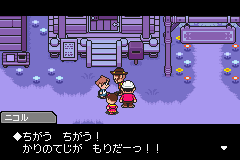 | 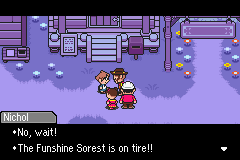 |
Clothesline Talk
When working on a translation, there are always things that a translator will feel very confident and 100% sure they got right. But every translator always runs into things they’re less-than-100% confident about. The natural reaction is to avoid ever pointing these things out afterward, but I’ll be covering many of these situations here in my MOTHER 3 notes because they’re sometimes the most interesting things of all.
The first one I can think of is this clothesline that most people miss. In Japanese, the text literally translates to:
You got a problem?!
This is “left out to dry”.
The issue here is that everything is very vague so it could be translated a few different ways. The way it’s presented makes me wonder if “Left Out to Dry” is the name of the building or business, but that doesn’t seem to be the sort of business it is. Maybe I’m wrong about that.
In any case, there are other ways of interpreting the line which may or may not be the intended meaning. I took the “this is just an angry clothesline” choice.
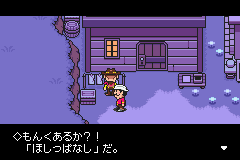 | 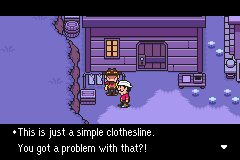 |
Do Ya Yado?
The inn and saloon in Tazmily is called “Yado”. At first I was going to translate this because “yado” means something like “inn” or “lodge”. But, I think during the second draft of the translation or so, I realized that when Tazmily modernizes, it’s still called the Yado Hotel. So it seemed logical to keep the name the same across both time periods.
I suppose I could’ve changed the name of the place to something more English-y, but working with compressed map graphics was one of my weak points. Also, “Yado” sounded unique and memorable anyway.
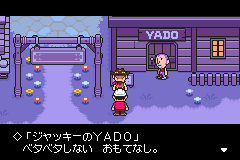 | 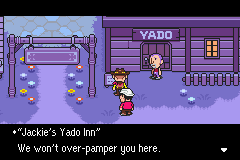 |
Incidentally, it appears it was going to have a different sign in earlier versions of the game:
 |
Formattin’ Forever
I mentioned before how I put a lot of work into the text in the hope of making it flow more naturally – namely, I read everything out loud until I was okay with it. By coincidence, this was how Itoi did his script writing too.
One thing that struck me when playing the Japanese version for the first time was that it was clear that Itoi had put a lot of work into formatting the text too. He put spaces in certain places just so, put line breaks in specific spots for certain reasons, and put page breaks in calculated locations.
Again, my own professional work – which is mostly with subtitles for films and videos – mirrored what Itoi did. When working on professional subtitles, one of the most important things is knowing where to break up lines that are too long to fit on screen all at once. There are actually several different philosophies for this sort of thing, it gets pretty complex.
Anyway, since this was what I did for a living already, I used those same techniques to format all the text in the game by hand. So if you ever see a line break at a certain point or if you wonder why text is displayed in a certain way, it’s because it felt the most logical that way.
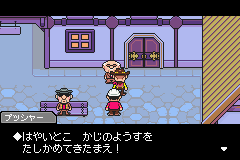 | 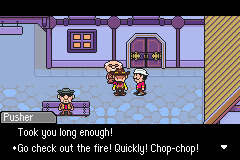 |
Again, this is something I hoped players would never consciously notice but might unknowingly appreciate anyway.
It’s funny, because one of the things that always impressed me about EarthBound was how it auto-formatted text on the fly. It certainly would’ve been a lot easier to write an auto-formatter for MOTHER 3’s text (either in the game’s coding or as an external utility) but doing it by hand let me polish up the text more anyway.
Also, I always thought it was unprofessional when sometimes in games you’d have an unfinished sentence that would continue on the next page with only one word left to print. That just feels lazy, you know?
Pray It Loud
The sanctuary place outside of Tazmily is literally called the “Pureya Sanctuary”. “Pureya” is a take on the English words “player” and “prayer”, just slightly misspelled.
I was at a loss on how to bring this across in translation, so I left it as “Prayer” because calling it the “Player Sanctuary” would’ve thrown people out of the game more than was probably intended.
But this is where these translation notes come in handy! Now you know the secret behind the sanctuary!
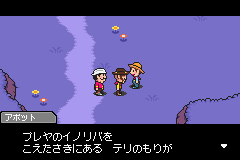 | 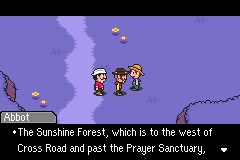 |
Graveyard News
In Japanese, the graveyard is called “Misoshire Cemetery”. Note that this is pronounced “mee-soh-shee-reh”.
As far as I can tell, it’s possibly based on the word “misoshiru”, which means “miso soup”. That’s just a wild guess though – I mean, why would the place be called that?
So, not knowing what to do with the cemetery’s name, I left it untouched for a good while. Later, I realized that the infamous debug room in the game used a lot of earlier names for locations throughout the game. And for this cemetery it used the name “Sunset Cemetery”.
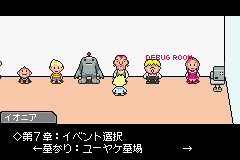 |
That sounded great to me. And, although there’s no connection or anything, it also made a good match with “Sunshine Forest”. So Sunset Cemetery it became!
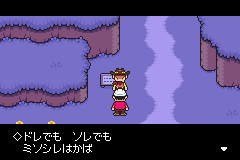 | 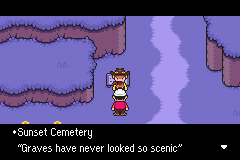 |
As for the description of the cemetery on this sign, in Japanese it’s got word play that’s really difficult to translate. I could try, but it wouldn’t make much sense or even be very close to the original.
So… bonus challenge for translators! Let me know what you think a good translation for this would’ve been!
In any case, I would need to localize the line anyway, so I struggled for a while to come up with something that didn’t feel “trying too hard to be funny”. It’s a surprisingly tough job!
My hope was that players wouldn’t even bat an eye at it. Did it work?
The Giant Leader
Late in the game, it’s revealed that this tall guy was named after the word “Leader” but without being the actual word “Leader”.
For a good while I wasn’t sure how to handle this. Some early FAQs by other folks called him “Ledr”, but I was never too fond of that spelling. It just seemed too… forced. Or too non-name-like.
In the end, I wound up simply dropping the “a” and calling him “Leder”. I feel there might still have been a better solution, but I couldn’t find it.
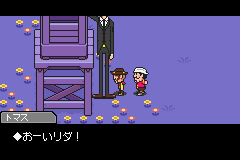 | 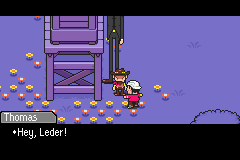 |
Bird of Doom
Followers of the MOTHER 3 translation blog may remember this sparrow – oh, how hard I fought against this devilish beast!
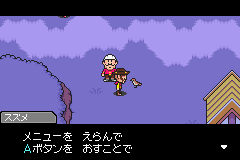 | 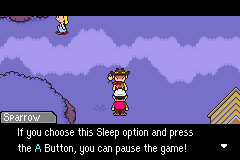 |
Basically, I spent a week or two with this bird, trying to reprogram the main text routine. I used this bird as a test bed because it has such a long line with lots of long sentences.
Some quick examples of me wrestling with this sparrow’s text include:
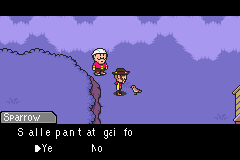 | 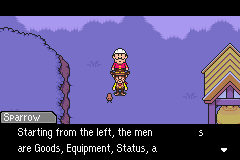 |
Now, whenever I see this sparrow, I’m immediately reminded of all that time it took to rewrite the main text programming. Actually, looking back, this is the case for lots of things in the game. Everything reminds me of when I was translating or hacking so-and-so part.
I guess this is something musicians and artists experience too. It’s weird. But it’s also left me with a really unique and rich view of the game!
The Vomit Button
There are these two guys who live in Tazmily who like to make jokes that aren’t even really good jokes at all.
In Japanese, they’re called “Entotsu” and “Achato”. Their names come from a really old Japanese comedy duo known as Entatsu Achako.
I love Abbott and Costello stuff, so almost immediately I decided to go with “Bud” and “Lou” for the localized names here.
By coincidence, one of the earlier translation teams had gone with that same choice. It was a cool surprise to see that we fans were on the same wavelength on so many of these choices!
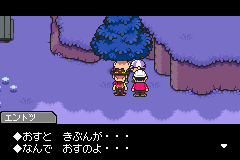 | 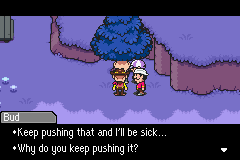 |
Also, this particular exchange always confused me until about halfway through the project. In it, Bud keeps saying, “Stop pushing that, I’m gonna be sick if you keep pushing that!”
Eventually it dawned on me that “that” was referring to the controller button! I think a lot of people don’t get this exchange either, but now it’s one of my favorites in the game.
This also goes to show how important it is for a translator to have critical reading skills. Hooray, all those college English classes have finally paid off!
Pray Some
While translating the game I was struck with how often praying and prayer came up in the text. With EarthBound’s localization most religious themes and things revolving around prayer were written around… minus Paula’s Pray command for some odd reason.
Of all the questionable content in MOTHER 3, I don’t think the more modern NOA would’ve rewritten the religious stuff in the game had it released an official localization. Still, I’m curious to peek into alternate timelines and see how it was handled anyway.
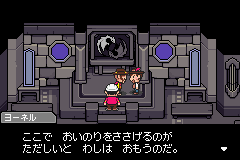 | 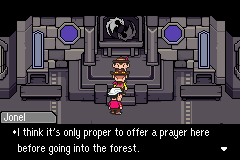 |
Name Thyself
Just like in EarthBound, in MOTHER 3 you’re asked to enter the name of you, the player. Similarly, you’re asked to do this twice in EarthBound and you’re asked to do it twice in MOTHER 3.
This player-naming screen uses some slightly different coding than the character naming screens, but luckily it wasn’t too hard to mess with. Jeff gets all the credit for the naming screen hacking in the game – I don’t think I messed with any of this naming screen programming except in passing while working on other hacks.
Anyway, because of how the player naming screens work in the Japanese version (which I’ll detail later, in Chapter 5) we were able to greatly increase the number of letters you can have in your name. In the Japanese version, you could only enter 9 characters. In our English patch, we upped this to some big number I don’t remember anymore, around twice as many, I’d say.
Of course, having so many more letters – and having a variable width font – meant that we needed to expand the window display slightly for the English version. And access to the Japanese character sets had to be disabled.
Again, this was all Jeff’s doing, so when you name yourself, think of him!
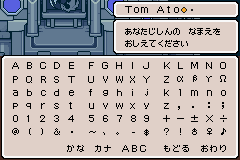 | 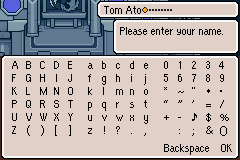 |
I just remembered that we also had some good, lengthy discussions on how to arrange the letters in our naming screens. If you look closely, you can see we didn’t stick with the configuration used in the Japanese version. After trying out various types, we settled with one that seemed the least hassle-inducing for players.
Hard Mode Mania
Near the very end of the project we added in some little extras of our own. But the unwritten rule was that things we added shouldn’t be discoverable by accident.
One of these additions was a “Hard Mode” I created for the game. Without cheating or using the Internet, the only way you’d find out about this is by completing the enemy encyclopedia-type thing in the game, which is a troublesome feat enough as it is.
Anyway, when you do this, a frog will say some extra things during the ending of the game:
…Whoaaaaaaaaaaa~
I’ve just been possessed by the spirit of the translation developers…!
Wow! You must be a real hardcore fan of this game to completely fill up your Battle Memory!
You’re amazing!
So amazing that you deserve an extra bonus! So listen close!
Name yourself “HARD MODE” in Chapter 1! It’ll make things a bit more challenging! Good luck!
But this is a secret just between you and me, so don’t tell aaaaanyone!
Okay, time to go back to being a regular frog!
…
…
Naturally, doing this makes the game harder!
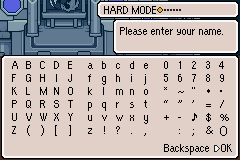 |
I actually forget how the idea for this mode came up, but since I’d been messing with battle stuff so much at the time it was a cinch to add in extra programming to change enemy stats when their data was being loaded. I think I’d considered there being a secret item you could get that would unlock Hard Mode, but the naming thing made more sense and was WAY easier.
Which brings me to my next point – I sometimes wonder if adding in little bonuses like this actually detracts from the experience and professionalism. Like I said, I wanted to make all these extras as hidden as possible so that it wouldn’t tarnish players’ initial experiences with the game. But, on the other hand, adding in our own things seems… childlike in a way, I guess.
What I mostly remember is thinking that I wish EarthBound had had more extra stuff to do – there’s very little to do besides the main quest besides maybe the Sword of Kings hunt. Yet EarthBound fans play the game over and over, often creating challenges for themselves. So I thought it might be nice to have a built-in challenge that fans could try when they’d played the game normally enough and wanted a different experience with the game.
”So, how exactly does it make the game harder?” you probably asked ten paragraphs ago. Well, it:
- Doubles enemies’ HP
- Quadruples enemies’ speed
I did some play testing with it before releasing the patch and found that upping the speed seemed to make enemies feel more vicious, but that might’ve just been my imagination. I had a blast trying to beat a lot of the bosses – my goal was to make it so you’d need to use techniques and strategies you probably overlooked during the normal game.
News of this mode got out only two days after the patch was released. Naturally, players didn’t listen to the frog but instead told everyone far and wide about it. I also had the interesting experience of watching it get revealed for the first time AND getting to interact with the revealer.
So, as you can see there’s a lot to say about this Hard Mode – I could go on and on about it. But I’m curious to know what fans think – did you like it? Hate it? Think it wasn’t hard enough? Have you even tried it? Should it never have been added in? Think a new mode should be added? Let me know!
Rubbernecks Revisited
Outside of the burning forest, Ed is holding back a few citizens who just want to gawk at the chaos and get in the way.
I translated part of his line as, “Don’t worry, I’ll hold back these rubberneckers!”
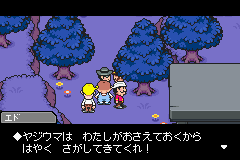 | 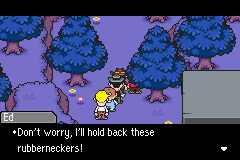 |
A “rubbernecker” refers to someone who’s prone to gawking at accidents or other incidents and getting in others’ way by doing so. Usually in a driving context but not always.
Obviously, this is a pretty rare word to hear in real life – so I don’t know how I came up with it for the translation here. But, while playing EarthBound long after the MOTHER 3 patch was out, I was surprised to see that the term was used at the beginning of EarthBound too!
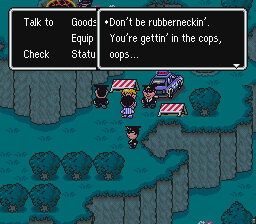 |
I can only guess that I was again unconsciously channeling EarthBound’s translation when working on MOTHER 3’s translation. This happened a few more times too throughout the project it seems. Maybe it was just coincidence.
Battle Square
There’s so much to say about battles that I don’t even know where to start. I guess a good point would be to say that most of the difficult hacking in the project involved reprogramming all the text display routines in the game.
I’d say there were at least a dozen or more text display routines that had to get redone. These can be grouped into three general categories: main text displays, menu text displays, and battle text displays. What’s more, they all seemed to be programmed by different people with completely different styles. It was like none of them actually worked with each other. In all cases, though, it was clear the programmers hadn’t considered translations into other languages, based on the frameworks they all constructed.
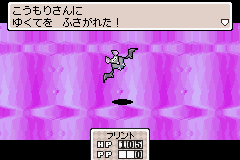 | 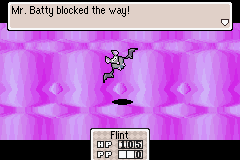 |
Anyway, reprogramming the battle text was tough, but it was also the easiest to reprogram after doing some out-of-the-box thinking. While I was at it, I decided to try my hand at what EarthBound’s localizers did and create an auto-formatting routine for battle text. It makes the text way more professional-looking than a lot of Dragon Warrior-style RPGs, and even better than EarthBound which had some funky battle text formatting because the translators accidentally left in MOTHER 2’s formatting control codes in many battle lines.
If none of that makes sense, then basically I wanted to make sure the game didn’t write lines like:
Lucas attacked
Muttshroom!Boney used
Pencil Rocket on
Muttshroom!Muttshroom
became tame!
Here are some random examples from EarthBound:
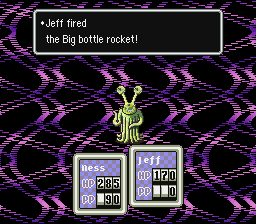 | 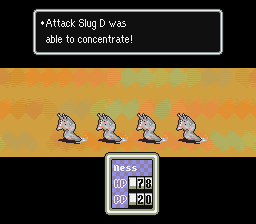 |
Of course, most people probably don’t have a problem with this or have ever even noticed it, but as a subtitle guy I’m always fighting against screen space limitations, so it’s something I’m very mindful of.
The problem here is that different names have different lengths, so unless you have an auto-formatter in place you’re stuck having to do pre-formatting like the above. That feels lazy and unprofessional, though, at least in this day and age.
Also, I should briefly mention that there were multiple types of battle text display routines, all of which basically did the same thing but for some reason used different code. I’ll give more details on them later, though.
I could go on and on about battle text, but for now just know we put in lots of work to make sure the translated text gets displayed as nicely as possible.
Horoscope Equipment
A lot of the equipment in the game is named after real-life constellations.
In Japanese, much of these are actually named after the animals themselves, like the “Ram Bracelet”. Their item descriptions say they’re based on the actual constellations, though.
I’m not sure why after all this time, but I went with the actual zodiac names rather than the animals themselves. So rather than “Ram Bracelet” it became the “Aries Bracelet”.
This is honestly something I can’t remember at all; it might’ve been something an earlier group did and I just went with it. Looking at it now, I think going with the animal names might’ve been better. Then again, “Ram Bracelet” might make you think you can ram into stuff with it on. I dunno.
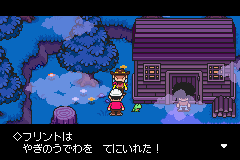 | 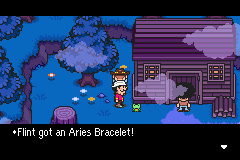 |
Poetry Club
There’s a surprising amount of poetry in MOTHER 3, mostly of the haiku type. This is one of those things that translators live for but also go crazy trying to find just the right translation for.
Basically, almost every hot spring in the game has a sign in front of it that has a short little haiku telling you to take a five-second dip in the hot spring in question. For the most part, they all follow a set template, which literally translates to something like:
There’s no need to rush
Soak for five seconds
____ Hot Spring
For the English localization, I kept the translated text as a haiku and did some haiku-like formatting with the text. Generally, the English template goes something like:
There’s no need to rush
Five seconds rejuvenates
____ Hot Spring
In general, haiku poems go 5 syllables / 7 syllables / 5 syllables. But sometimes extra syllables are acceptable – I don’t know the details about this, I just know it happens sometimes and the poet will sometimes mention that extra syllables were used at the end.
In the case of the Japanese version of MOTHER 3, whenever extra syllables are used, it’ll say “(Extra syllables)” at the end of the hot spring text. I think there might even be cases of missing syllables too.
I left this syllable count stuff in the English localization, only I made sure the syllable messages applied to the English text and not the original Japanese text.
If none of that makes sense, don’t worry. It’s just a case of being super-extra picky. I got the impression that many English-speaking fans didn’t even understand these “(Extra syllables)” messages anyway.
Incidentally, for whatever reason, every hot spring in the game has copies of every hot spring sign’s text associated with it. For example, this particular hot spring line also has copies of every other hot spring text stored right next to it. This means the programmers wasted a lot of space in the script data.
So, when the end of our translation project came and we discovered our script was too big, we did some programming magic to only keep one copy of all the hot spring lines and we rerouted all the hot spring signs to use these singular copies.
Again, if that doesn’t make any sense, we basically improved on the game’s sloppy programming so we could fit the English text into the game.
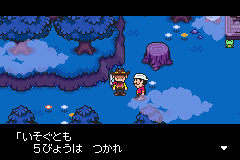 | 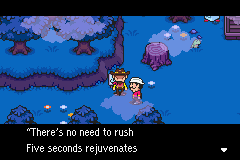 |
Peace at any Price
A bird at this hot spring gives you advice. Part of its advice includes:
You know the type, right? They use the dash ability to zoom right by. I guess you could say they’re followers of “peace at any price”.
I was never sure if this “followers of peace at any price” thing conveyed the original meaning clearly enough. It refers to people who will avoid anything and everything that could possibly upset the status quo. For example, the type of people who will put up with other people’s crap just because they want to avoid confrontations.
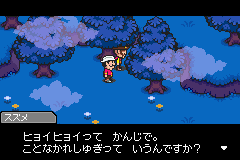 | 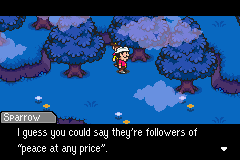 |
Period Piece
Actually, looking at that line again, you might notice that “peace at any price” has quotes around it, but it has a period outside of the quotes. This and other little things come up every once in a while – many people have told me over the years, “You got it wrong! You need to put the punctuation inside the quote marks!”
The problem is that everybody learns these sorts of things differently (other examples include apostrophe usage and comma usage), but there is no one right way – several different acceptable styles exist. I’ve always preferred to put punctuation outside quote marks as it seems the most logical to me. In fact, that style is often called “logical punctuation”.
There’s a whole bunch more on the topic on Wikipedia and elsewhere so I won’t cover it here, but I thought it was worth explaining that there are multiple styles that are acceptable.
 |  |
The Wise Bird Talks
The talking bird continues and eventually gives you another helpful haiku! Here’s the Japanese original and my version side-by-side:
| Japanese Version (literal) | English Version |
| If you run away too much you will regret it, oh young one | Always running off will only lead to regret my young disciple |
It’s not too different in translation, but I was struggling for something good to fit in the last five syllables and all I could think of was “my young disciple” for some reason. My mind kept going back to that, so I went with it.
Of course, that changes the bird’s character and makes him into a sort of master-teaching-a-pupil type of character, but now that I think about it that’s actually not too far off from what its original purpose is.
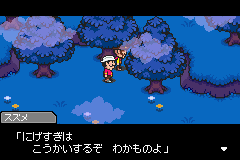 | 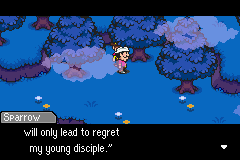 |
Hot Water Haiku
The haikus just keep comin’! There’s a line by Thomas that a lot of players miss – if you get in the hot spring while Thomas is in your party but then try to get out of the hot spring before the healing effect kicks in, Thomas will stop you and say:
| Japanese Version (literal) | English Version |
| There’s no need to rush Soak for five seconds Honyararara | There’s no need to rush five seconds rejuvenates Fa-la-la-la-la |
In Japanese, “honyarara” is how you pronounce stuff that’s blanked out. So what’s happening here is that Thomas starts to say the standard hot spring haiku used in the game but the ends it with what is basically filler meant to serve as an “insert something here” sort of thing.
For the English localization, I went with “Fa-la-la-la-la” because “blank blank blank blank blank” didn’t really seem like a good choice to me. “Blankety-blank” might’ve worked too, but it doesn’t have enough syllables. The next thing that came to mind was, for some reason, “Fa-la-la-la-la”. And when I tried it out in the actual game, I found that I liked it better than I expected.
It winds up changing the joke slightly, but in a way it seems more natural this way in English. At least to me.
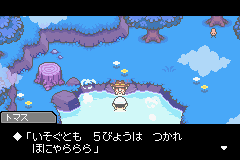 | 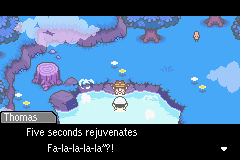 |
Spoils of War
I mentioned that we added all kinds of fancy support for “the”, “a”, “an” and more for items in the main script. Naturally, we also included item article support in battle text too. It had to be programmed in from scratch again because the battle text and main script text routines were originally programmed by completely different people.
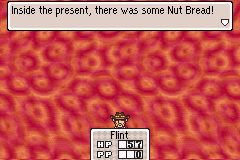 |
Incidentally, if your inventory is full, the game will ask you to either throw away an item you have or to abandon the item you won. For whatever reason, the game uses a different text display routine for this, so it had to be hacked too.
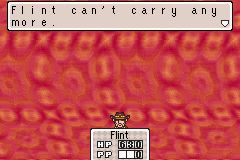 |
I’d say 75% of the hacking we had to was getting the game to not look like crap with the EarthBound font, and this was just one tiny example piece of that puzzle.
Hello, Lighter
One of Tazmily’s denizens is named “Lighter”. Technically, his name is based on the word “Lighter”, it isn’t actually the correct Japanese spelling of the English word. It’s complicated. But basically he’s “Lighter”, as in the thing that lights cigarettes and fires and stuff.
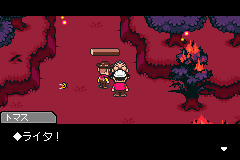 | 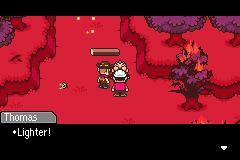 |
While we’re here, here’s a look at how this scene looked in the Nintendo 64 version of MOTHER 3:
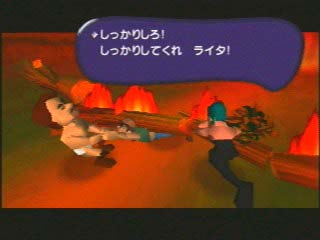 |
Here, the line is something loosely like, “Hang on! Hang on, Lighter!”
Avert Your Eyes
Here, Lighter says “D-dammit” in the English localization. Oh my god a Nintendo game just said a bad word! …Is what I thought a lot a people would say, but it actually turned out that most people didn’t notice or got over it pretty quickly.
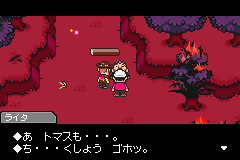 | 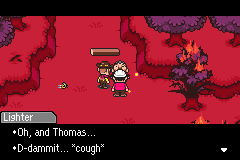 |
So this is the start of the discussion of swear words in Japanese-to-English translations. It’s a really interesting topic but also pretty lengthy, so I’ll try to stick to the key points.
Basically, Japanese doesn’t use “swearing” as we do. Instead, Japanese consists of multiple politeness levels, and depending on your social standing between you and the speaker, your intent, and such stuff, you pick from the appropriate politeness level. You talk up to your teachers for example, while a department head at a company will talk down to his subordinates. There are different levels, and one of the lowest levels to talk to someone is the closest equivalent to our swearing.
A quick example of “eat”. Here are a bunch of different levels of telling someone to eat.
- Omeshiagari kudasaimase
- Omeshiagatte kudasai
- Tabete kudasai
- Tabete kure
- Tabete
- Tabero
- Kue
The proper word to use depends on who’s talking, who’s being spoken to, what their relationship is, what the intent is, and other context things. By going against what’s proper, you can talk rudely, which is what swearing accomplishes in our language (and other similar languages).
Even words like “kuso” have multiple translations, you could call it the “shit” in one case, while in other case it could be as harmless as “dang it!”. You’d even hear “kuso” in Pokemon anime I’m sure, for example. I know I heard it in Beyblade often enough.
Because all of this is so subjective, swearing in translation can vary pretty crazily depending on the translator. Generally, the more experience, the better the swearing turns out. That’s why with fan translations (particularly anime and manga) you tend to see tons of swearing in what would seem to be kids’ shows or what have you.
Also, because of all this, I really doubt the Japanese rating system takes this politeness level stuff into account, since it occurs everywhere in Japanese entertainment. It’s also not taboo. You don’t want to talk in everyday situations the way they do in entertainment, but you’re not going to go to hell or get your mouth soaped if you use the wrong level. You’ll just really tick people off or possibly get killed.
For the MOTHER 3 fan translation, I obviously had no intention of going into amateur-crazy-swearing mode, but I also didn’t want to go 100% the other way and avoid swearing altogether. I didn’t want to compromise on what I thought was the script’s intention. It’s a tough balance, but having been an amateur fan translator at one point and also having years of professional translation experience helped a lot.
Commenters on the project blog sometimes asked about if there’d be swearing or not in the game. When I mentioned there’d be just a few swears (I think the final total was maybe around ten instances or so, but I might be wrong), one younger reader reacted quite dramatically and created a meme in the process.
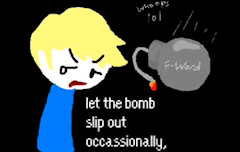 |
Having run EarthBound communities for many years I was used to this sort of reaction from fans. Still, this reminded me how enormous of a deal swearing is for some people. The horrible deaths, blood, sexual innuendo, child neglect, corruption, animal cruelty, and all the other terrible things that exist in MOTHER 3 are no problem at all… but mention there’s some bad words (which aren’t that bad) and some people blow up. But that’s just how our culture is.
Anyway, this stance on including swearing is also one thing where I’m certain I strayed from what an official localization would’ve done. And, to be honest, every once in a while I wonder if I made the right choice to include swearing in the translation. But I tried to stay true to the script and the characters wherever possible, so I’m also glad I didn’t purposely censor myself. I don’t know, it’s a tough issue.
Cohorting
Similar to what we did with items, we added in programming code that allows each enemy to have “a”, “an”, “the”, and such before their names. And then we used this to try to make battle text flow as smoothly as possible. There is one issue that arose from this, but we’ll look at that later.
Besides this, we also added code that handles the issue of multiple enemies in a natural way.
The Japanese text adds a “-tachi” at the end of the designated “main enemy” if you encounter more than one enemy. This essentially makes it something like, “(Enemy) and the others” or “(Enemy) and companions” or “(Enemy)’s group”.
This works to an extent in English – if you run into three enemies, for example, you could say, “You encountered (Enemy) and its allies!”
What happens when you encounter a group of two enemies, though? That sentence wouldn’t work. So we reprogrammed the game to handle special situations like this that aren’t an issue in Japanese but are an issue in English.
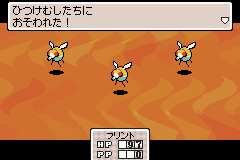 | 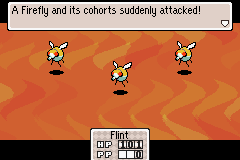 |
It’s actually the little things like this that make it tough to support translations of the game into other languages. Each language has its own little quirks in grammar that need to be taken into account on a case-by-case basis. It’s very tiring.
Fueling the Fire
Lighter’s son is named “Fuel” in the localization. In Japanese, his name is pronounced “Foo-eh-roo”. This made me wonder if his name really is supposed to be “Fuel” as we know it.
I don’t completely remember how I was finally convinced that “Fuel” was right, but it was well before the translation project at least. Perhaps it’s derived from another language that pronounces “fuel” differently? If anyone knows, please let me know!
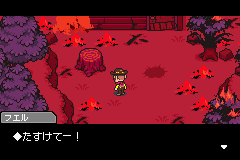 | 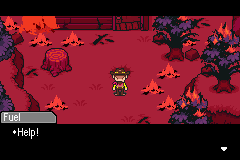 |
Notice This
Something that sort of got lost in the MOTHER 2 to EarthBound localization was that non-dialogue text originally had a different-looking text bullet than normal dialogue text. But in EarthBound, all the text used the same text bullet. I think.
Because we used EarthBound’s font in MOTHER 3, this same thing happened. Non-dialogue text uses an unfilled text bullet in the Japanese version, but the English version just uses the same text bullet as everything else.
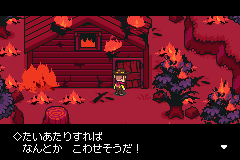 | 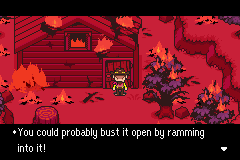 |
In the end it’s not a big deal, but it’s something that’s always there in the back of my mind whenever I play the translation patch.
Honorifics Anonymous
A common thing in fan translations – mostly in manga, anime, and the like – is that inclusion of Japanese honorifics like “-san”, “-chan”, “-sama”, and all that. There are many arguments for including these and many arguments for getting rid of them. I’ve been on both sides in my professional work, and usually at any one time I’m working on multiple projects where one includes honorifics and another doesn’t.
In any case, because I didn’t want this to seem super-amateur-y and wanted to make the game similar to what NOA might’ve done, I didn’t include honorifics in the MOTHER 3 translation. So there’s no “Flint-san”, for example – it’s “Mr. Flint”. It just seemed more natural to me that way anyway.
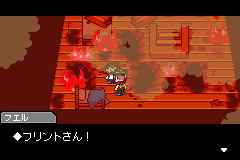 | 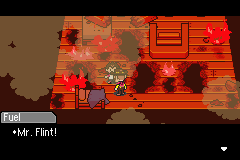 |
This is Murrica
As mentioned before, I tried to keep the writing in the translation natural, which meant not treating the translation like an assignment for an English class. This included writing the way people actually talk, but it also included things like not going out of my way to be super-duper grammatically correct everywhere.
For instance, a number of people have told me, “When you sneak up on an enemy, it says ‘snuck’ but ‘snuck’ isn’t a real word. It should be ‘sneaked’.”
Again, this is one of those things where everyone learns the language a little bit differently and there’s no single correct way to do something. Every country, every region, and every school has its own little differences in how language is used.
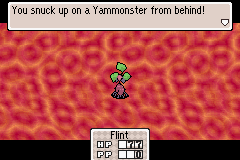 |
Head Chomper
After saving Fuel from the burning building, you’ll see a few Tazmily citizens near the entrance to the forest. Two of them, Abbey and Abbot, talk about some weird flying mouse that bit Abbey.
The way the text is presented has actually led some players to believe that there’s domestic abuse going on in this relationship! That’s how powerful words can be – so it’s important to always be wary of how you phrase things when translating.
No, there’s no domestic abuse going on – remember, at this point Tazmily is a utopian society that’s completely peaceful. The things the citizens say should be taken at face value.
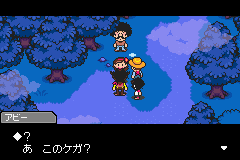 | 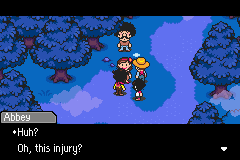 |
That said, it’s likely that this misunderstanding arose because one of Abbey’s lines didn’t get polished up enough during the final draft. What she says in the current version is:
There was no bizarre creature.
It didn’t fly. It wasn’t mousey. It wasn’t buggy. It didn’t bite me.
She says this if you talk to Abbey again after she explains how she got an injury on her head and how a flying mouse bit her.
The problem is that this extra line is optional and easy to miss, and I guess I missed it during the polishing phase of the game. The text in the game is stored somewhat haphazardly, so knowing the context is important. And, with this context, she should say something more like:
There didn’t use to be hard-to-explain creatures like that.
Creatures that fly. And are mousey. And are bug-like. And are bitey.
So hopefully that clears that up!
Also… Wow, apparently I fixed this line in the 1.1 version of the patch and completely forgot about it!
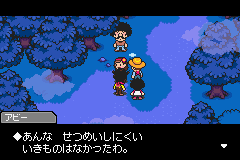 | 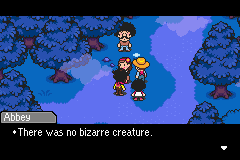 |
Mending
Later on you find Lighter lying on a table outside the sanctuary. He talks to a bunch of the villagers as he tends to his own injuries.
There’s actually not much to say about this scene except it’s one of the few times I’ve ever got to write “Consarnit!” in a translation. Which makes it special to me!
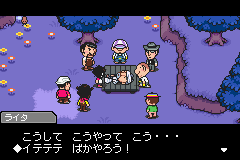 | 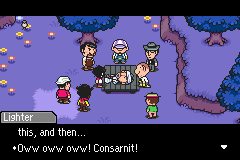 |


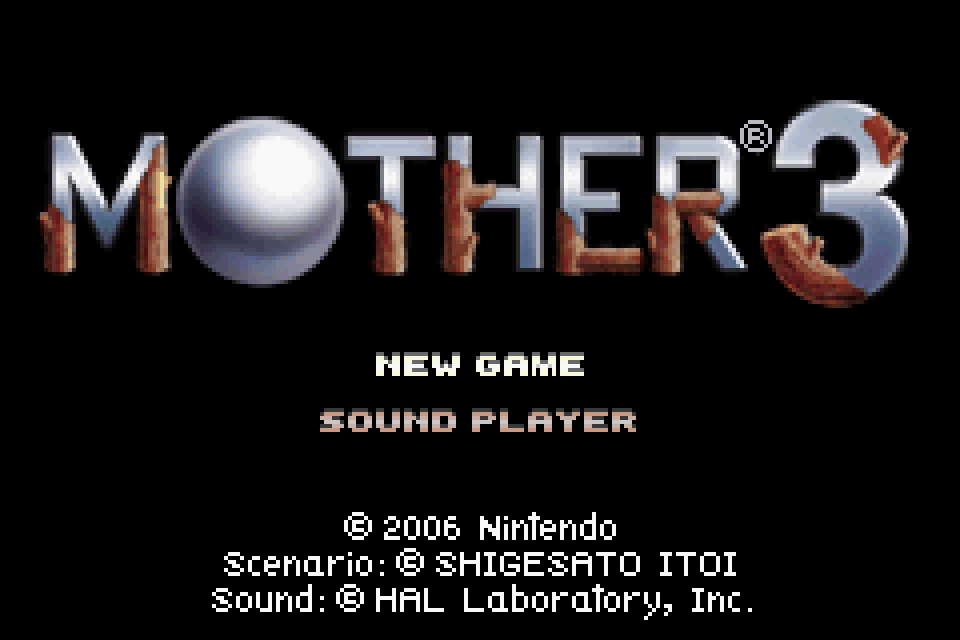
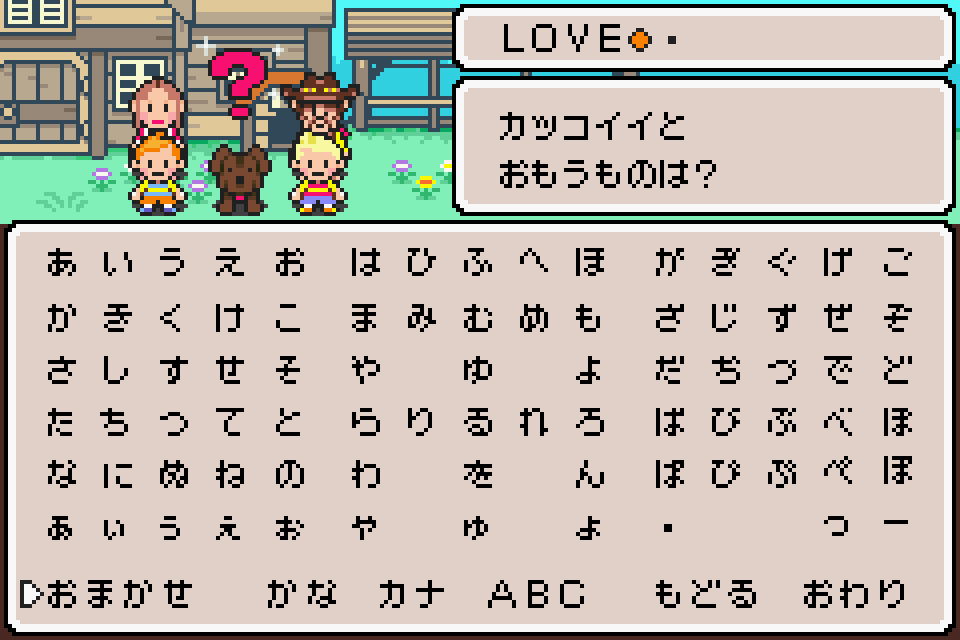
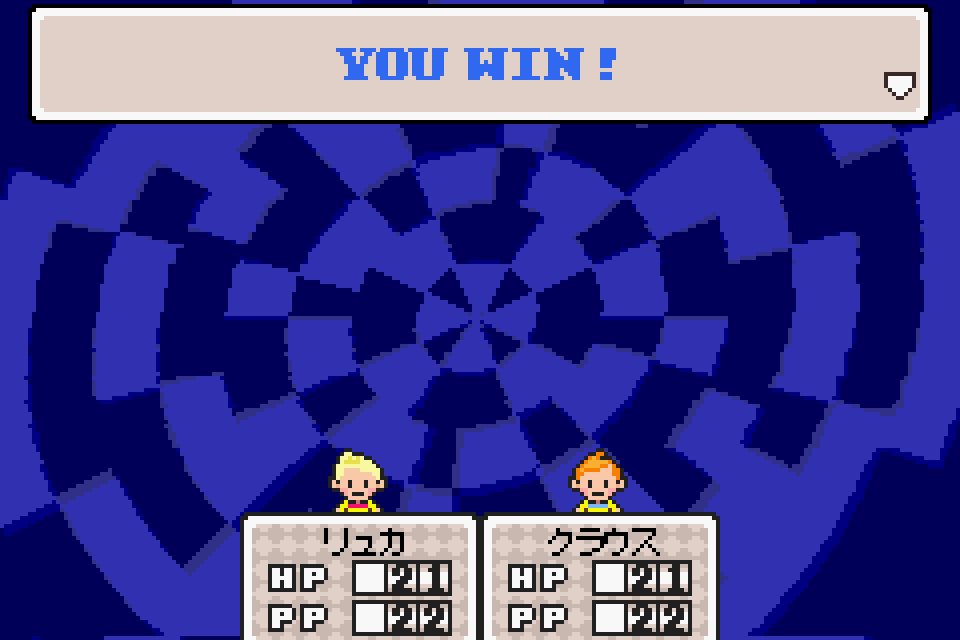
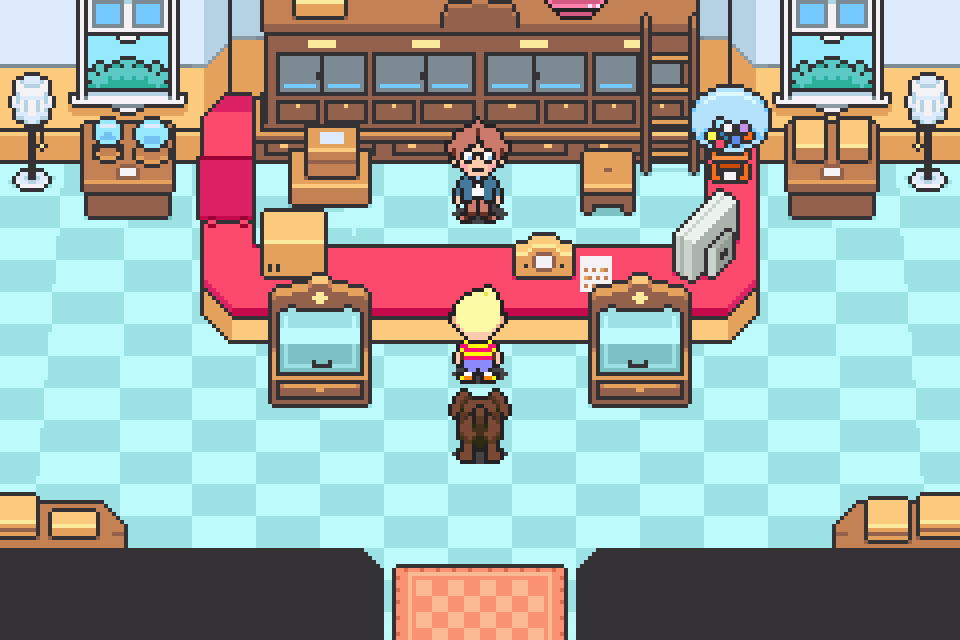
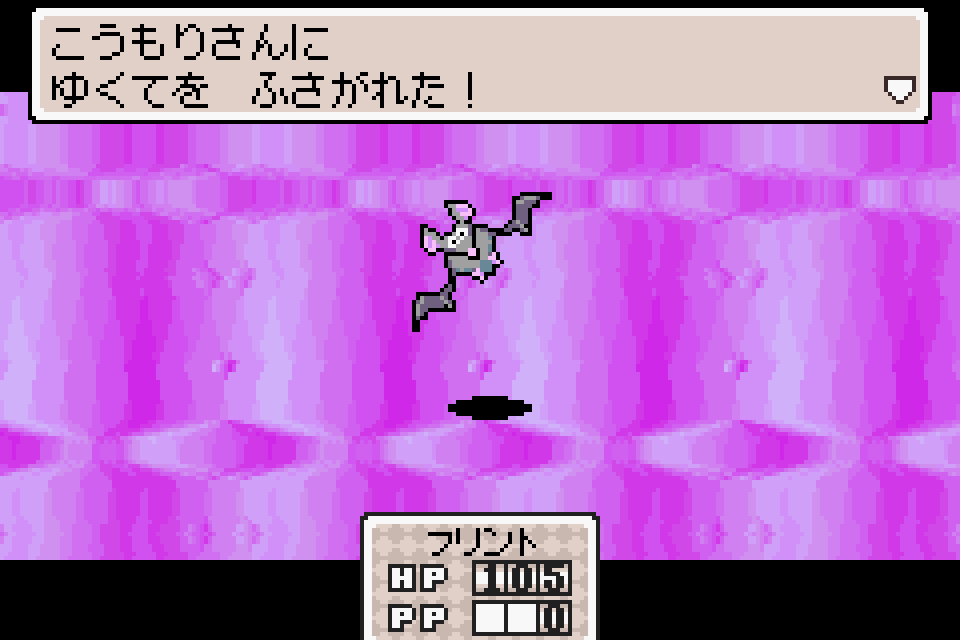
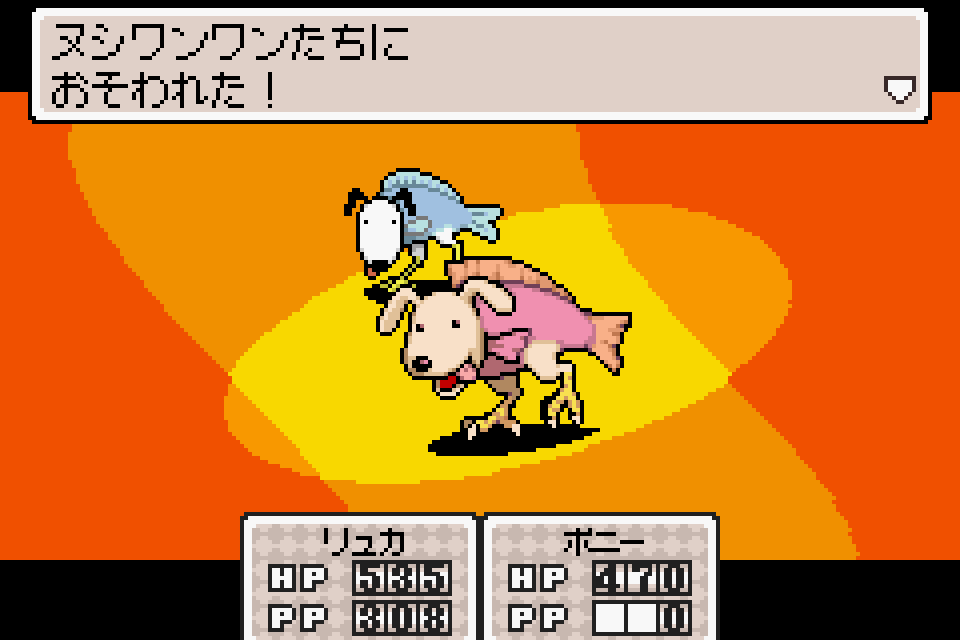
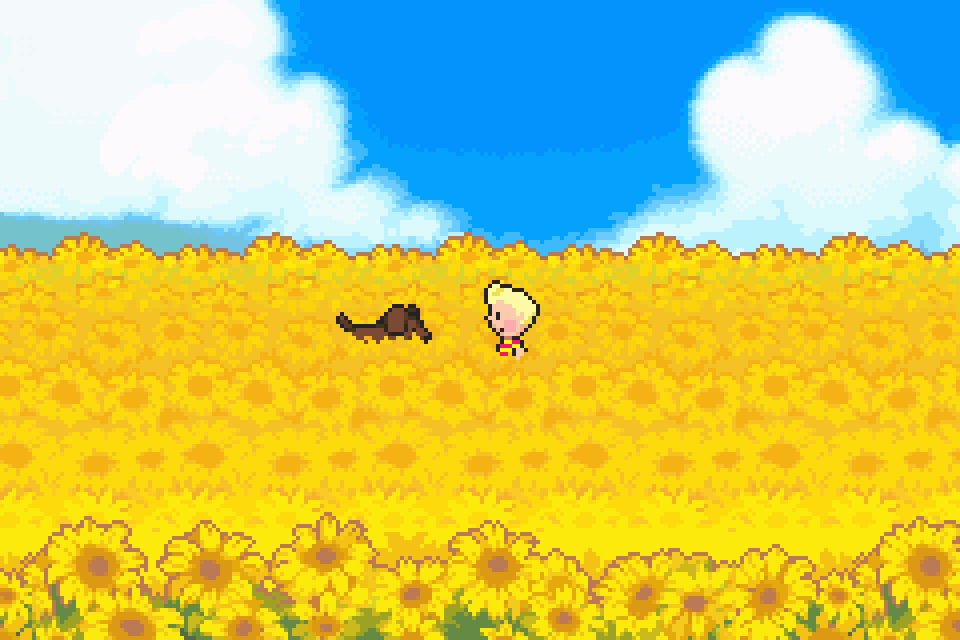
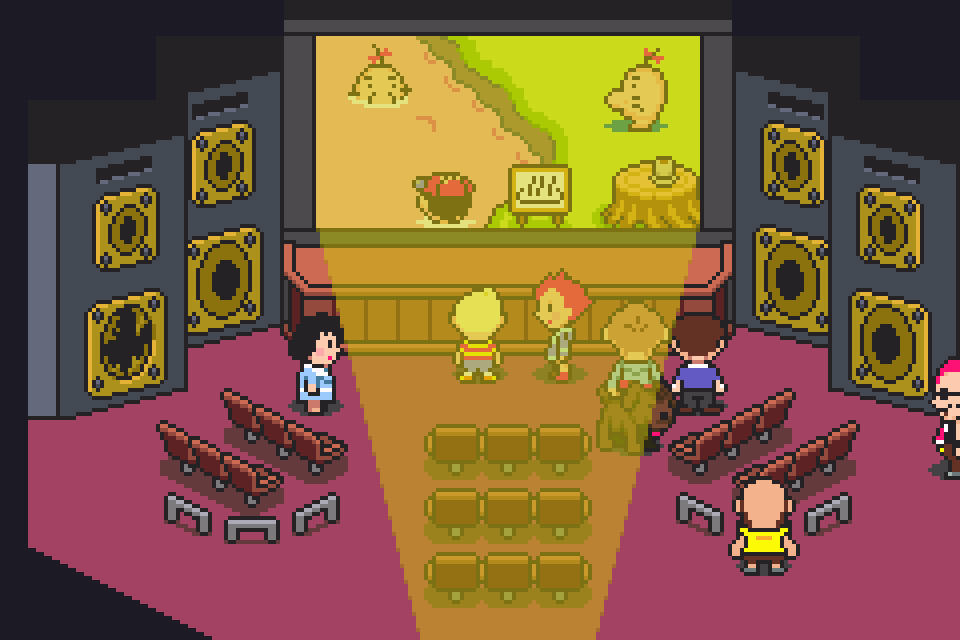
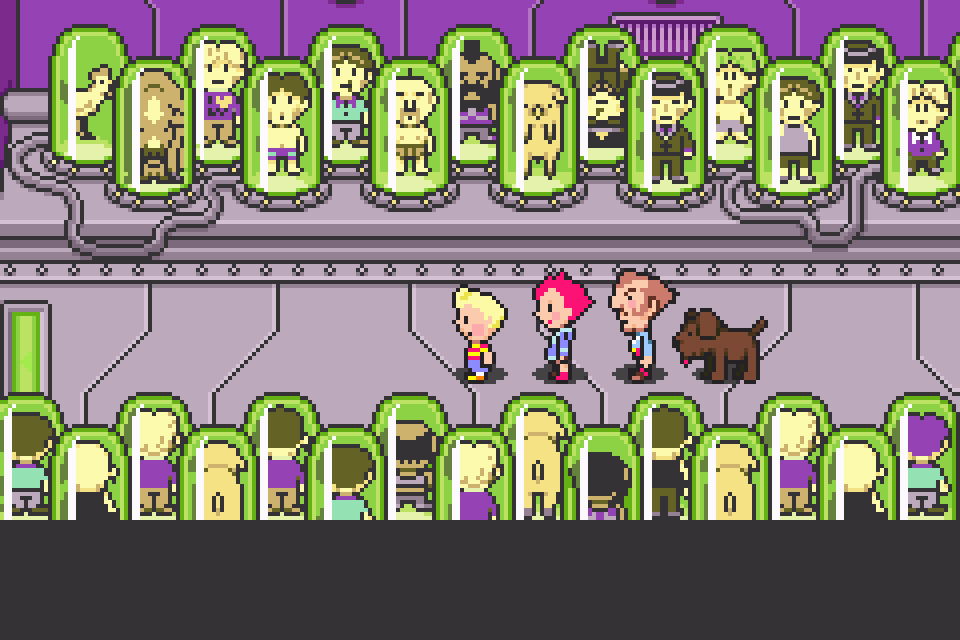
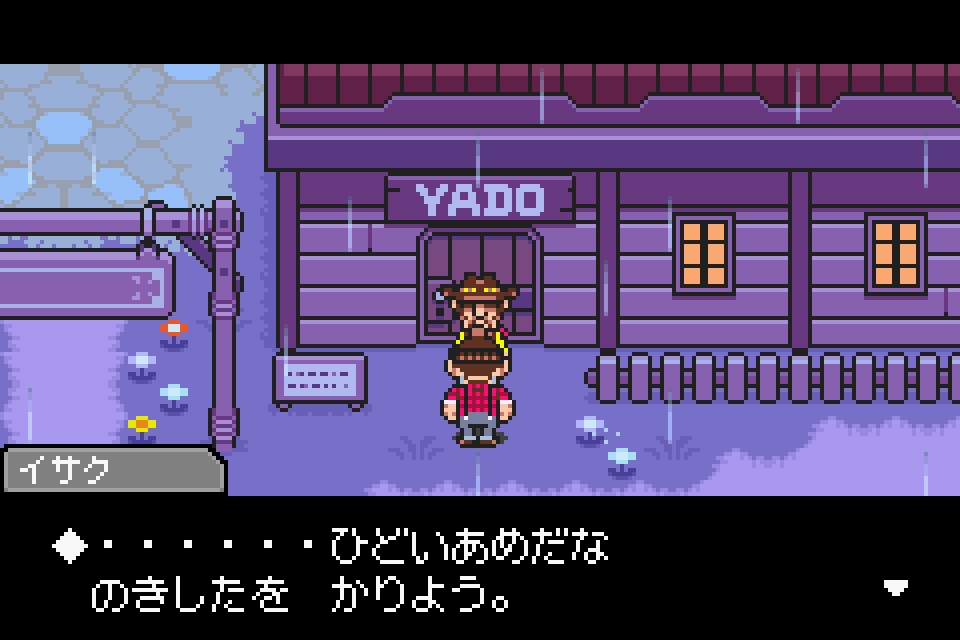
![Passport to MOTHER 2 [Learn Japanese!] Passport to MOTHER 2 [Learn Japanese!]](https://legendsoflocalization.com/wp-content/uploads/2018/05/pp-m2.jpg)